- Home
- Richard Preston
The Book of the Dead
The Book of the Dead Read online
The Book of the Dead (2006)
BY DOUGLAS PRESTON AND LINCOLN CHILD
Book 3 of the Pendergast Trilogy
Lincoln Child dedicates this book to his mother, Nancy Child
Douglas Preston dedicates this book to Anna Marguerite McCann Taggart
Acknowledgments
We would like to thank the following people at Warner Books: Jaime Levine, Jamie Raab, Beth de Guzman, Jennifer Romanello, Maureen Egen, and Devi Pillai. Thanks also to Larry Kirshbaum for being a believer in us almost from day one. We want to thank our agents, Eric Simonoff of Janklow & Nesbit Associates and Matthew Snyder of the Creative Artists Agency. A bouquet of hothouse orchids to Eadie Klemm for keeping us all neat and dusted off. Count Niccolò Capponi of Florence, Italy, suggested (brilliantly) our use of the Carducci poem. And, as always, we want to thank our wives and children for their love and support.
1
Early-morning sunlight gilded the cobbled drive of the staff entrance at the New York Museum of Natural History, illuminating a glass pillbox just outside the granite archway. Within the pillbox, a figure sat slumped in his chair: an elderly man, familiar to all museum staff. He puffed contentedly on a calabash pipe and basked in the warmth of one of those false-spring days that occur in New York City in February, the kind that coaxes daffodils, crocuses, and fruit trees into premature bloom, only to freeze them dead later in the month.
“Morning, doctor,” Curly said again and again to any and all passersby, whether mailroom clerk or dean of science. Curators might rise and fall, directors might ascend through the ranks, reign in glory, then plummet to ignominious ruin; man might till the field and then lie beneath; but it seemed Curly would never be shifted from his pillbox. He was as much a fixture in the museum as the ultrasaurus that greeted visitors in the museum’s Great Rotunda.
“Here, pops!”
Frowning at this familiarity, Curly roused himself in time to see a messenger shove a package through the window of his pillbox. The package had sufficient momentum to land on the little shelf where the guard kept his tobacco and mittens.
“Excuse me!” Curly said, rousing himself and waving out the window. “Hey!” But the messenger was already speeding away on his fat-tire mountain bike, black rucksack bulging with packages.
“Goodness,” Curly muttered, staring at the package. It was about twelve inches by eight by eight, wrapped in greasy brown paper, and tied up with an excessive amount of old-fashioned twine. It was so beaten-up Curly wondered if the messenger had been run over by a truck on the way over. The address was written in a childish hand: For the rocks and minerals curator, The Museum of Natural History.
Curly broke up the dottle in the bottom of his pipe while gazing thoughtfully at the package. The museum received hundreds of packages every week from children, containing “donations” for the collection. Such donations included everything from squashed bugs and worthless rocks to arrowheads and mummified roadkill. He sighed, then rose painfully from the comfort of his chair and tucked the package under his arm. He put the pipe to one side, slid open the door of his pillbox, and stepped into the sunlight, blinking twice. Then he turned in the direction of the mailroom receiving dock, which was only a few hundred feet across the service drive.
“What have you got there, Mr. Tuttle?” came a voice.
Curly glanced toward the voice. It was Digby Greenlaw, the new assistant director for administration, who was just exiting the tunnel from the staff parking lot.
Curly did not answer immediately. He didn’t like Greenlaw and his condescending Mr. Tuttle. A few weeks earlier, Greenlaw had taken exception to the way Curly checked IDs, complaining that he “wasn’t really looking at them.” Heck, Curly didn’t have to look at them—he knew every employee of the museum on sight.
“Package,” he grunted in reply.
Greenlaw’s voice took on an officious tone. “Packages are supposed to be delivered directly to the mailroom. And you’re not supposed to leave your station.”
Curly kept walking. He had reached an age where he found the best way to deal with unpleasantness was to pretend it didn’t exist.
He could hear the footsteps of the administrator quicken behind him, the voice rising a few notches on the assumption he was hard of hearing. “Mr. Tuttle? I said you should not leave your station unattended.”
Curly stopped, turned. “Thank you for offering, doctor.” He held out the package.
Greenlaw stared it at, squinting. “I didn’t say I would deliver it.”
Curly remained in place, proffering the package.
“Oh, for heaven’s sake.” Greenlaw reached irritably for the package, but his hand faltered midway. “It’s a funny-looking thing. What is it?”
“Dunno, doctor. Came by messenger.”
“It seems to have been mishandled.”
Curly shrugged.
But Greenlaw still didn’t take the package. He leaned toward it, squinting. “It’s torn. There’s a hole . . . Look, there’s something coming out.”
Curly looked down. The corner of the package did indeed have a hole, and a thin stream of brown powder was trickling out.
“What in the world?” Curly said.
Greenlaw took a step back. “It’s leaking some kind of powder.” His voice rode up a notch. “Oh my Lord. What is it?”
Curly stood rooted to the spot.
“Good God, Curly, drop it! It’s anthrax!”
Greenlaw stumbled backward, his face contorted in panic. “It’s a terrorist attack—someone call the police! I’ve been exposed! Oh my God, I’ve been exposed!”
The administrator stumbled and fell backward on the cobblestones, clawing the ground and springing to his feet, and then he was off and running. Almost immediately, two guards came spilling out of the guard station across the way, one intercepting Greenlaw while the other made for Curly.
“What are you doing?” Greenlaw shrieked. “Keep back! Call 911!”
Curly remained where he was, package in hand. This was something so far outside his experience that his mind seemed to have stopped working.
The guards fell back, Greenlaw at their heels. For a moment, the small courtyard was strangely quiet. Then a shrill alarm went off, deafening in the enclosed space. In less than five minutes, the air was filled with the sound of approaching sirens, culminating in an uproar of activity: police cars, flashing lights, crackling radios, and uniformed men rushing this way and that stringing up yellow biohazard tape and erecting a cordon, megaphones shouting at the growing crowds to back off, while at the same time telling Curly to drop the package and step away, drop the package and step away.
But Curly didn’t drop the package and step away. He remained frozen in utter confusion, staring at the thin brown stream that continued to trickle out of the tear in the package, forming a small pile on the cobbles at his feet.
And now two strange-looking men wearing puffy white suits and hoods with plastic visors were approaching, walking slowly, hands outstretched like something Curly had seen in an old science fiction movie. One gently took Curly by the shoulders while the other slipped the package from his fingers and—with infinite care—placed it in a blue plastic box. The first man led him to one side and began carefully vacuuming him up and down with a funny-looking device, and then they began dressing him, too, in one of the strange plastic suits, all the time telling him in low electronic voices that he was going to be all right, that they were taking him to the hospital for a few tests, that everything would be fine. As they placed the hood over his head, Curly began to feel his mind coming back to life, his body able to move again.
“Scuse me, doctor?” he said to one of the men as they led him off
toward a van that had backed through the police cordon and was waiting for him, doors open.
“Yes?”
“My pipe.” He nodded toward the pillbox. “Don’t forget to bring my pipe.”
2
Dr. Lauren Wildenstein watched as the “first response” team carried in the blue plastic hazmat container, placing it under the fume hood in her laboratory. The call had come in twenty minutes earlier, and both she and her assistant, Richie, were ready. At first it sounded like it might be the real deal for a change, something that actually fit the profile of a classic bioterror attack—a package sent to a high-profile New York City institution, dribbling brown powder. But on-site testing for anthrax had already come up negative, and Wildenstein knew that this one would almost certainly be another false alarm. In her two years leading the New York City DOHMS Sentinel laboratory, they had received over four hundred suspicious powders to analyze and, thank God, not one had turned out to be a bioterror agent. So far. She glanced at the running tally they kept tacked to the wall: sugar, salt, flour, baking soda, heroin, cocaine, pepper, and dirt, in that order of frequency. The list was a testament to paranoia and too damn many terror alerts.
The delivery team left and she spent a moment staring at the sealed container. Amazing, the consternation a package of powder could cause these days. It had arrived half an hour ago at the museum, and already a guard and a museum administrator had been quarantined, given antibiotics, and were now being treated by mental health services. It seemed the administrator was particularly hysterical.
She shook her head.
“Whaddya think?” came a voice from over her shoulder. “Terrorist cocktail du jour?”
Wildenstein ignored this. Richie’s work was top-notch, even if his emotional development had been arrested somewhere between the third and the fourth grade.
“Let’s run an X-ray.”
“Rolling.”
The false-color X-ray that popped up on the monitor screen showed the package was full of an amorphous substance, with no letter or any other objects visible.
“No detonator,” Richie said. “Darn.”
“I’m going to open the container.” Wildenstein broke the hazmat seals and carefully lifted out the package. She noted the crude, childish scrawl, the lack of a return address, the multiple strands of badly tied twine. It seemed almost designed to arouse suspicion. One corner of the package had been abraded by mishandling, and a light brown substance not unlike sand dribbled from it. This was unlike any bioterror agent she had studied. Awkwardly, on account of her heavy gloves, she cut the twine and opened the package, lifting out a plastic bag.
“We’ve been sandbagged!” said Richie with a snort.
“We treat it as hazardous until proven otherwise,” said Wildenstein, although her private opinion was the same as his. Naturally, it was better to err on the side of caution.
“Weight?”
“One point two kilo. For the record, I’m noting that all the biohazard and hazmat alarms under the hood are reading zero.”
Using a scoop, she took a few dozen grains of the substance and distributed them into half a dozen test tubes, sealed and racked them, then removed them from beneath the hood, passing them on to Richie. Without needing to be told, he started the usual set of chemical reagents, testing for a suite.
“Nice having a shitload of sample to work with,” he said with a chuckle. “We can burn it, bake it, dissolve it, and still have enough left over to make a sand castle.”
Wildenstein waited while he deftly did the workups.
“All negative,” he reported at last. “Man, what is this stuff?”
Wildenstein took a second rack of samples. “Do a heat test in an oxidizing atmosphere and vent the gas to the gas analyzer.”
“Sure thing.” Richie took another tube and, sealing it with a vented pipette which led to the gas analyzer, heated the tube slowly over a Bunsen burner. Wildenstein watched, and to her surprise the sample quickly ignited, glowing for a moment before disappearing, leaving no ash or residue.
“Burn, baby, burn.”
“What do you have, Richie?”
He scrutinized the readout. “Just about pure carbon dioxide and monoxide, trace of water vapor.”
“The sample must have been pure carbon.”
“Gimme a break, boss. Since when does carbon come in the form of brown sand?”
Wildenstein peered at the grit in the bottom of one of the sample tubes. “I’m going to take a look at this stuff under the stereozoom.”
She sprinkled a dozen grains onto a slide and placed it on the microscope stage, turned on the light, and looked through the oculars.
“What do you see?” Richie asked.
But Wildenstein did not answer. She kept looking, dazzled. Under a microscope, the individual grains were not brown at all, but tiny fragments of a glassy substance in myriad colors—blue, red, yellow, green, brown, black, purple, pink. Still looking through the oculars, she picked up a metal spoon, pressed it on one of the grains, and gave a little push. She could hear a faint scritch as the grain scratched the glass.
“What’re you doing?” Richie asked.
Wildenstein rose. “Don’t we have a refractometer around here somewhere?”
“Yeah, a really cheap job dating back to the Middle Ages.” Richie rummaged around in a cabinet and drew out a dusty machine in a yellowed plastic cover. He set it up, plugged it in. “You know how to work this puppy?”
“I think so.”
Using the stereozoom, she plucked a grain of the substance and let it sink into a drop of mineral oil she put on a slide. Then she slid the slide into the reading chamber of the refractometer. After a few false starts, she figured out how to turn the dial and obtain a reading.
She looked up, a smile on her face.
“Just what I suspected. We have an index of refraction of two point four.”
“Yeah? So?”
“There we are. Nailed it.”
“Nailed what, boss?”
She glanced at him. “Richie, what is made of pure carbon, has an index of refraction above two, and is hard enough to cut glass?”
“Diamond?”
“Bravo.”
“You mean, what we’ve got here is a bag of industrial diamond grit?”
“That’s what it would seem.”
Richie removed his hazmat hood, wiped his brow. “That’s a first for me.” He turned, reached for a phone. “I think I’ll put a call in to the hospital, let them know they can stand down from biological alert. From what I heard, that museum administrator actually soiled his drawers.”
3
Frederick Watson Collopy, director of the New York Museum of Natural History, felt a prickling of irritation on the back of his neck as he exited the elevator into the museum’s basement. It had been months since he’d been down in these subterranean depths, and he wondered why the devil Wilfred Sherman, chairman of the Mineralogy Department, was so insistent on his coming to the mineralogy lab instead of Sherman’s coming to Collopy’s office on the fifth floor.
He turned a corner at a brisk walk, his shoes scraping the gritty floor, and came to the mineralogy lab door—which was shut. He tried the handle—locked—and in a fresh surge of irritation knocked sharply.
The door was opened almost immediately by Sherman, who just as quickly closed and locked it behind them. The curator looked disheveled, sweaty—not to put too fine a term on it, a wreck. As well he should, thought Collopy. His eye swept the lab and quickly fixed on the offending package itself, soiled and wrinkled, sitting in a double-ziplocked bag on a specimen table next to a stereozoom microscope. Beside it lay a half-dozen white envelopes.
“Dr. Sherman,” he intoned, “the careless way this material was delivered to the museum has caused us major embarrassment. This is nothing short of outrageous. I want the name of the supplier, I want to know why this wasn’t handled through proper procurement channels, and I want to know why such valuable material wa
s handled so carelessly and misdelivered in such a way as to cause a panic. As I understand it, industrial-grade diamond grit costs several thousand dollars a pound.”
Sherman didn’t answer. He just sweated.
“I can just see the headline in tomorrow’s newspaper: Bioterror Scare at the Natural History Museum. I’m not looking forward to reading it. I’ve just gotten a call from some reporter at the Times—Harriman something or other—and I have to call him back in half an hour with an explanation.”
Sherman swallowed, still saying nothing. A drop of sweat trickled down his brow and he quickly wiped it away with a handkerchief.
“Well? Do you have an explanation? And is there a reason why you insisted on my coming to your lab?”

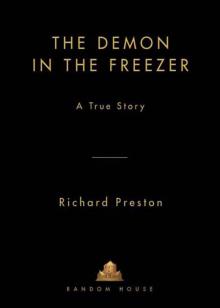 The Demon in the Freezer
The Demon in the Freezer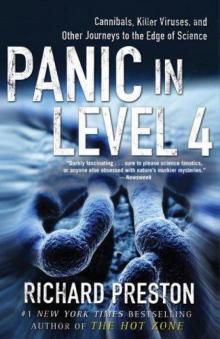 Panic in Level 4: Cannibals, Killer Viruses, and Other Journeys to the Edge of Science
Panic in Level 4: Cannibals, Killer Viruses, and Other Journeys to the Edge of Science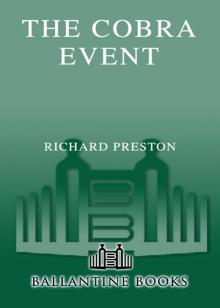 The Cobra Event
The Cobra Event The Hot Zone
The Hot Zone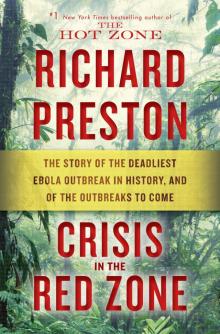 Crisis in the Red Zone
Crisis in the Red Zone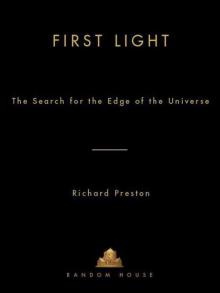 First Light: The Search for the Edge of the Universe
First Light: The Search for the Edge of the Universe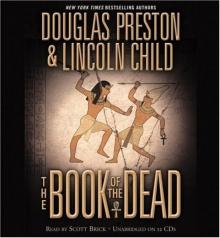 The Book of the Dead
The Book of the Dead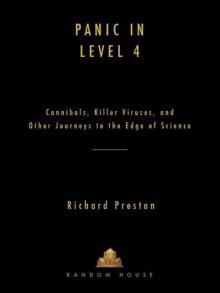 Panic in Level 4
Panic in Level 4